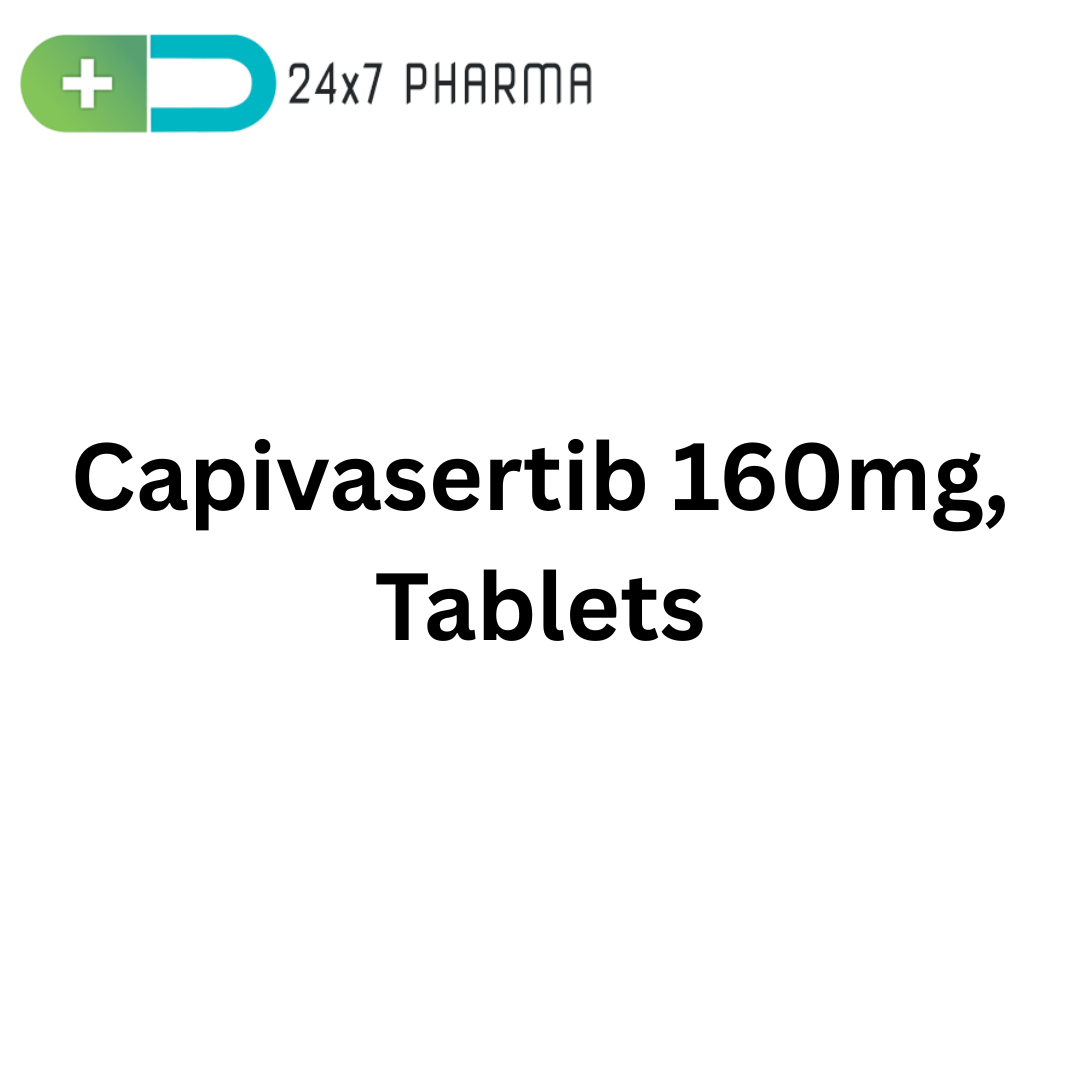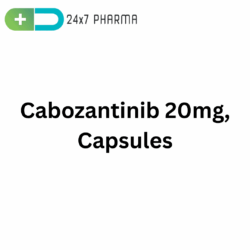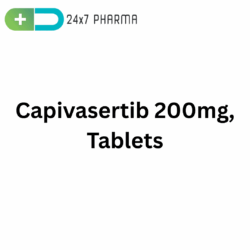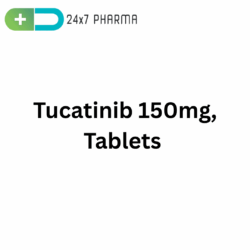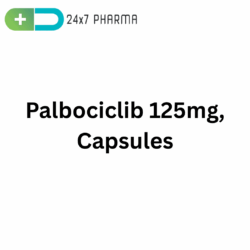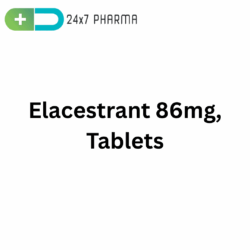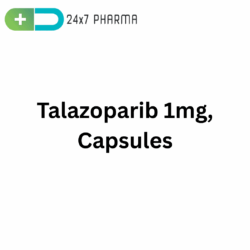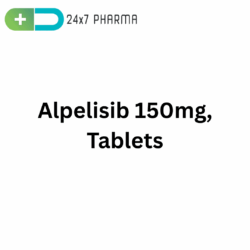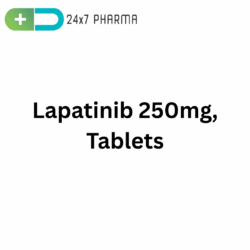LuciCapiva 160mg, Capivasertib Tablets
Capivasertib is an oral medication primarily used in oncology to treat certain types of advanced breast cancer. It functions as a potent inhibitor of the AKT signaling pathway, which is often dysregulated in various cancers.
What Is Capivasertib?
Capivasertib is a small-molecule, oral drug that targets all three isoforms of the AKT enzyme (AKT1, AKT2, and AKT3). By inhibiting AKT, capivasertib disrupts critical downstream signaling pathways involved in cell survival, growth, and metabolism, thereby exerting antitumor effects .
LuciCapiva is primarily used in the treatment of hormone receptor-positive (HR+), HER2-negative advanced or metastatic breast cancer in adults, especially those who have specific genetic alterations such as mutations in the PIK3CA, AKT1, or PTEN genes.
Capivasertib works by inhibiting the AKT protein, a crucial component of the PI3K/AKT/mTOR signaling pathway, which plays a significant role in cancer cell growth, survival, and resistance to therapy. When this pathway becomes overactive—often due to mutations—it can promote cancer progression and resistance to conventional treatments like endocrine therapy.
LuciCapiva is available in oral tablet form and is taken on an intermittent dosing schedule (typically 4 days on treatment followed by 3 days off). This strategy helps reduce toxicity while maintaining efficacy.
Mechanism of Action
This inhibition leads to reduced phosphorylation of downstream targets such as GSK3, FOXO transcription factors, and TSC2. Consequently, tumor cell proliferation is halted, and apoptotic pathways are activated .
Targeting AKT Kinases:
Capivasertib binds to the ATP-binding sites of all three AKT isoforms (AKT1, AKT2, and AKT3). By doing this, it prevents AKT activation and subsequent phosphorylation of downstream targets.
Blocking Cancer Cell Growth:
- When AKT is inhibited:
- It halts tumor cell proliferation
- Promotes apoptosis (programmed cell death)
- Disrupts glucose metabolism in cancer cells
- Reduces the production of proteins that aid cancer progression (like mTOR and S6K)
Impact on Mutated Cancer Cells:
In cancers with mutations in PIK3CA, AKT1, or PTEN, the pathway becomes hyperactivated, making tumor cells especially dependent on AKT signaling for survival. Capivasertib’s action in these tumors is particularly effective, as it targets their core survival mechanism.
Synergistic Use with Hormonal Therapy:
Capivasertib is often combined with Fulvestrant, which blocks estrogen receptors in hormone receptor-positive breast cancers. By blocking AKT, capivasertib can restore sensitivity to endocrine therapy, improving outcomes in resistant tumors.
Indications
Capivasertib is typically used in combination with fulvestrant in patients who have progressed on prior endocrine therapies .
Treatment of Advanced or Metastatic Breast Cancer:
- Hormone receptor-positive (HR+)
- Human epidermal growth factor receptor 2-negative (HER2-)
- Locally advanced or metastatic breast cancer
Who have one or more alterations in the PI3K/AKT/PTEN pathway, specifically:
- PIK3CA mutation
- AKT1 mutation
- PTEN loss or mutation
- And have progressed on at least one endocrine-based therapy (e.g., aromatase inhibitors, tamoxifen, or fulvestrant alone)
Dosage and Administration
Capivasertib is typically taken orally twice day for four days, with three days off in between. Until the condition worsens or the toxicity becomes intolerable, this cycle is repeated.
Monitoring Parameters
- Blood glucose levels: Risk of hyperglycemia
- Skin condition: Monitor for rash
- Liver function tests: Periodic assessment
- General side effects: Fatigue, diarrhea, nausea
Side Effects
Common side effects of capivasertib include:
- Rash : Often acneiform or maculopapular. May require topical or oral corticosteroids.
- Fatigue : A frequent side effect; can impact daily activities. Encourage rest and hydration.
- Nausea and Vomiting : Usually mild to moderate. Anti-nausea medications may be use.
- Decreased appetite : Can lead to weight loss over time; nutritional support may be need.
- Stomatitis (mouth sores) : May cause pain or difficulty eating. Use of mouthwashes or topical treatments may help.
- Hyperglycemia : Elevated blood sugar, especially in patients with pre-existing diabetes or insulin resistance. Regular glucose monitoring is require.
- Headache : Usually mild; over-the-counter analgesics may be used under guidance.
Serious side effects
- Grade 3/4 Diarrhea : Persistent or severe diarrhea may cause dehydration or kidney issues; hospitalization may be need.
- Severe Rash or Skin Reactions : Can become extensive or blistering (e.g., Stevens-Johnson Syndrome – rare); may require corticosteroids and discontinuation.
- Severe Hyperglycemia : May need insulin or other glucose-lowering therapies temporarily.
- QT Prolongation (Heart Rhythm Disturbance) : Rare, but ECG monitoring may be need in patients with cardiac history.
- Frequent liver function tests are advised for liver toxicity (increased AST/ALT).
- Allergic Reactions : Rare, but can include swelling, hives, or difficulty breathing : seek emergency care.
Storage
Store capivasertib at room temperature, between 20°C and 25°C (68°F to 77°F), in a dry place away from moisture and heat. Do not store in the bathroom .
Benefits
Capivasertib has demonstrated efficacy in improving progression-free survival in patients with AKT pathway alterations. In clinical trials, the combination of capivasertib and fulvestrant significantly reduced the risk of disease progression compared to fulvestrant alone .
- cancer cells : Delays progression Proven to double progression-free survival
- Overcomes resistance : Makes tumors responsive again to hormone therapy
- Oral, convenient dosing : Easy to take at home with fewer interruptions
- Better tolerability : More manageable side effects than chemotherapy
- New mechanism: HR+/HER2-breast cancer treated with the first AKT inhibitor
- Extends treatment options : Useful in later-line or endocrine-refractory settings
Prescription
Capivasertib is a prescription medication and should be use under the supervision of a qualified healthcare provider. It is essential to undergo genetic testing to identify AKT pathway alterations before initiating therapy.
Drug Interactions
- Strong CYP3A4 inhibitors : Ketoconazole, ritonavir Avoid or monitor closely
- Strong CYP3A4 inducers include carbamazepine and rifampin. Avoid to keep the effect from fading.
- Glucose-raising drugs : Corticosteroids, thiazides : Monitor blood sugar
- QT-prolonging drugs : Amiodarone, methadone Use caution, monitor ECG
- Herbal supplements : St. John’s Wort Avoid completely
FAQs
What is Capivasertib use for?
It’s use with fulvestrant to treat advanced HR+/HER2- breast cancer with PI3K/AKT/PTEN mutations.
What happens if I miss a dose?
Take it within 4 hours; otherwise skip and resume next dose—never double up.
Are there serious side effects?
Yes—diarrhea, rash, hyperglycemia, and liver issues may occur and need monitoring.
Does it interact with other drugs?
Yes, especially CYP3A4 inducers/inhibitors and drugs that affect blood sugar or heart rhythm.
Conclusion
Capivasertib 160 mg is a targeted therapy that offers a promising treatment option for patients with advanced breast cancer harboring AKT pathway alterations. Its mechanism of action, dosing regimen, and side effect profile should be carefully considere by healthcare providers to optimize therapeutic outcomes. Regular monitoring and appropriate dose adjustments are essential to manage potential side effects and ensure patient safety.

